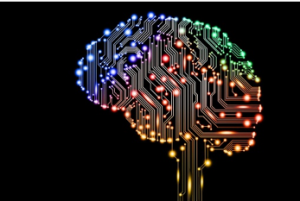Nursing and Artificial Intelligence
Software Column
by Allen McLean, RN, MN, MSc, PhD(c)
Allen is currently a PhD student in Health Sciences at the University of Saskatchewan (Saskatoon) in the Computational Epidemiology and Public Health Informatics Lab. His research interests include the development of computer modeling and simulation software for addressing health systems challenges, chronic diseases and health inequities at the population level, as well as mobile technologies applied in long-term care facilities. Allen previously attended the University of Victoria earning an MN and MSc (Health Information Science) in a unique dual degree program for Nursing Informatics professionals. Allen has over 20 years’ experience in healthcare as an ultrasound technologist, clinical educator, team leader and community health RN.
COLUMN
 Artificial Intelligence (AI) has got to be one of the hottest fields in tech right now. Rarely a day passes without some mention of AI in the media – everything from “AI is coming to take all our jobs!” to “AI is coming to solve all the world’s problems!” Of course the truth is no, maybe, and yes. AI has tremendous potential for improving the human condition, and some occupations and industries will be highly amenable to the adoption of AI, but others not so much. So how might AI influence nursing?
Artificial Intelligence (AI) has got to be one of the hottest fields in tech right now. Rarely a day passes without some mention of AI in the media – everything from “AI is coming to take all our jobs!” to “AI is coming to solve all the world’s problems!” Of course the truth is no, maybe, and yes. AI has tremendous potential for improving the human condition, and some occupations and industries will be highly amenable to the adoption of AI, but others not so much. So how might AI influence nursing?
First off, defining what we mean by AI is tricky – simply because there are many definitions out there, and experts have yet to agree on a single one that is universally accepted. Then we have the confusion resulting from the huge variety, and often highly imaginative pop culture references to AI – the most common being the false notion that AI and robots (automation) are one and the same. AI is the complex meshing of mathematical algorithms and software programming. A robot may or may not use AI, and in fact most operate using only sets of instructions (a program).
I like to think of artificial intelligence as the ability of a machine to imitate cognitive abilities we associate with humans, such as understanding, problem solving, and learning. AI systems can imitate these human abilities with varying degrees of success. Image and speech recognition, gaming, autonomous vehicles, simulation, data analysis, financial modeling, and internet search are some of the areas AI has established itself. It is important to recognize that when we talk about the current state of AI research, we mean task-specific AI – AI programs that only perform a single task (very well). For example, while AlphaGO [1] has consistently bested the top human Go players in the world, it would fail miserably at a game of checkers. Google image recognition software can be ‘taught’ to successfully and consistently identify dogs in images – but would fail if asked to identify cats, unless retrained. We are a long way from the holy-grail of AI – general purpose AI, machine intelligence that can successfully perform any intellectual task a human being can.
An early branch of AI that many nurses will be familiar with are clinical decision support systems (CDSS). A CDSS is a health information technology system that is designed to provide nurses and other healthcare professionals with clinical decision support – assistance with clinical decision-making tasks. Teams of computer experts and subject-matter experts (e.g. nurses) work together building a variety of tools that enhance decision-making in the clinical workflow. These tools include computerized alerts and reminders; clinical guidelines; condition-specific order sets; focused patient data reports and summaries; documentation templates; diagnostic support, and contextually relevant reference information, among others [2].
So what role might artificial intelligence play in nursing practice, research, or leadership? Honestly, at this point no one really knows. However, what is certain is that the people working in AI will not be waiting for nurses to join the conversation. Now is the time to educate ourselves and get involved!
References
[1] DeepMind (2017) AlphaGo. Retrieved from https://deepmind.com/research/alphago/
[2] HealthIT.gov (2017) Clinical Decision Support. https://www.healthit.gov/policy-researchers-implementers/clinical-decision-support-cds






